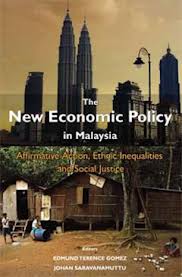On Terence Gomez and Johan Saravanamuttu (editors)’s The New Economic Policy in Malaysia
by Din Merican
 A new book, The New Economic Policy in Malaysia edited by Terence Gomez (University of Malaya) and Johan Saravanamuttu (Institute of Southeast Asian Studies–ISEAS, Singapore) was recently released and is now available in some of the major bookstores in Kuala Lumpur.
A new book, The New Economic Policy in Malaysia edited by Terence Gomez (University of Malaya) and Johan Saravanamuttu (Institute of Southeast Asian Studies–ISEAS, Singapore) was recently released and is now available in some of the major bookstores in Kuala Lumpur.
The book is a compilation of excellent essays by Malaysian and Singaporean researchers (mainly) on this controversial socio-economic programme which was launched in 1970 to address societal economic and social imbalances in Malaysia and promote national unity.Yet no publicity has been given to it by our mainstream media.
Why? For political correctness, I guess. But the book is not a political manifesto of any sort but a serious study of this unique attempt by the Malayan/Malaysian government to deal with post colonial problems of racial imbalance and poverty. It contains very useful data and ideas for policy makers like those in PEMANDU and the Economic Planning Unit, Prime Minister’s Department, and others interested in socio-economic development of our country.
I recommend it to you, my friends and associates, since the book includes some of the best essays by researchers in public policy I have read. It provides clear evidence that the NEP, despite its best intentions, “is reputed to have severely undermined interethnic social cohesion, inhibited genuine entrepreneurial capacity and contributed to serious new intra-Bumiputra inequities.” (Introduction by Gomez, Saravanamuttu and Maznah Mohamad, p.3)
best essays by researchers in public policy I have read. It provides clear evidence that the NEP, despite its best intentions, “is reputed to have severely undermined interethnic social cohesion, inhibited genuine entrepreneurial capacity and contributed to serious new intra-Bumiputra inequities.” (Introduction by Gomez, Saravanamuttu and Maznah Mohamad, p.3)
 best essays by researchers in public policy I have read. It provides clear evidence that the NEP, despite its best intentions, “is reputed to have severely undermined interethnic social cohesion, inhibited genuine entrepreneurial capacity and contributed to serious new intra-Bumiputra inequities.” (Introduction by Gomez, Saravanamuttu and Maznah Mohamad, p.3)
best essays by researchers in public policy I have read. It provides clear evidence that the NEP, despite its best intentions, “is reputed to have severely undermined interethnic social cohesion, inhibited genuine entrepreneurial capacity and contributed to serious new intra-Bumiputra inequities.” (Introduction by Gomez, Saravanamuttu and Maznah Mohamad, p.3)
The flyer for this book states: ” For more than 40 years the New Economic Policy and its successor programmes have shaped Malaysia’s socioeconomic development and the allocation of political power. The original policy sought to eradicate poverty and achieve economic parity among the country’s various ethnic communities. However, it was based on an apparent paradox–the use of ethnic preference to promote national unity. The policy’s core tenet was affirmative action on behalf of the Bumiputera community.
 Drawing on a wealth of statistical and documentary evidence, this major new book provides a comprehensive and rigorous assessment of the NEP. The contributors show that there have been some positive outcomes, among them a considerable reduction of poverty, greater interethnic equity, parity and the emergence of a resourceful Bumiputera middle class. But these partial successes have ti be weighted against persistent complaints associated increasing intraethnic Bumiputera income disparities; the emergence of a small politically powerful and disproportionately wealthy Bumiputera elite; a serious brain drain; and weak human capital. As a result, divisive debates about group rights, ethnic identity and an elusive national unity dominate Malaysia’s policy discourse. The New Economic Policy in Malaysia offers a timely and fresh perspective, suggesting that the long term implementation of racially-targeted policies reinforces stereotypical ethnic identities and hinders the creation of a more inclusive society.”
Drawing on a wealth of statistical and documentary evidence, this major new book provides a comprehensive and rigorous assessment of the NEP. The contributors show that there have been some positive outcomes, among them a considerable reduction of poverty, greater interethnic equity, parity and the emergence of a resourceful Bumiputera middle class. But these partial successes have ti be weighted against persistent complaints associated increasing intraethnic Bumiputera income disparities; the emergence of a small politically powerful and disproportionately wealthy Bumiputera elite; a serious brain drain; and weak human capital. As a result, divisive debates about group rights, ethnic identity and an elusive national unity dominate Malaysia’s policy discourse. The New Economic Policy in Malaysia offers a timely and fresh perspective, suggesting that the long term implementation of racially-targeted policies reinforces stereotypical ethnic identities and hinders the creation of a more inclusive society.”
This book has received some excellent reviews by internationally renown academics in the fields of social policy and economic development. Among them, Anthony Milner, Ozay Mehmet and Syed Farid Alatas.
“In this landmark volume a team of superb academic analysts examines the development and consequences of the New Economic Policy, the affirmative action initiative which defines Malaysia.Government policy will need to be justified all over again as a result of this trenchant critique.”–Anthony Milner, Basham Professor of Asian History, Australian National University and author of The Malays
“The New Economic Policy’s underlying philosophy was correct, but for too long it was administered inefficiently by politicians more interested in money politics. This new book is a welcome contribution to a landmark event in Malaysian economic development”.–Ozay Mehmet, Professor Emeritus of International Affairs, Carleton University, Canada and former Visiting Professor, University of Malaya.
“This important book suggests just how damaging race-based public policies can be for nation building and how they are to be distinguished from genuine affirmative action for the sake of disadvantaged groups”–Syed Farid Alatas, Associate Professor of Sociology and Head, Department of Malay Studies, National University of Singapore (NUS)



No comments:
Post a Comment
Note: Only a member of this blog may post a comment.